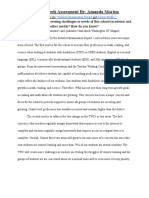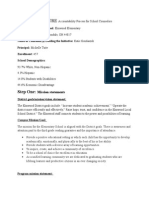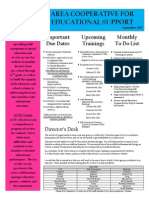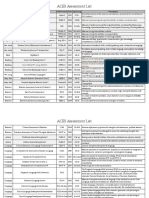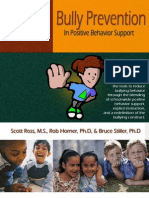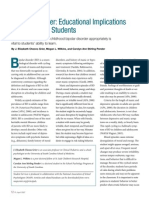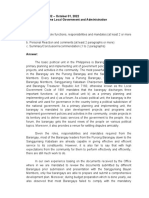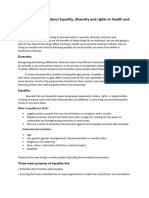March 2016
March 2016
Uploaded by
api-83101465Copyright:
Available Formats
March 2016
March 2016
Uploaded by
api-83101465Original Title
Copyright
Available Formats
Share this document
Did you find this document useful?
Is this content inappropriate?
Copyright:
Available Formats
March 2016
March 2016
Uploaded by
api-83101465Copyright:
Available Formats
AREA COOPERATIVE FOR
EDUCATIONAL SUPPORT
March 2016
ACES Mission
ACES is
committed to
providing a full
continuum of
special education
and
at-risk services
for
students in
member districts
from
pre-school
through 12th
grade, as well as,
to build the
capacity of the
educators and
school systems in
addressing the
issues that
interfere with
educational
outcomes.
ACES Vision
ACES will strive to
be a
comprehensive
program of
services for
students whose
behavioral
difficulties and
academic issues
interfere with
their educational
performance. The
Important Upcoming Monthly
Due Dates Trainings To Do List
Due 03/01/2016:
Submit request to
Release Proportionate
Share Carryover funds, if
applicable
Due 04/30/2016: FY16
Part B Budget
Application Amendments
Communicate districts
social worker contract
intentions with ACES
Director by 03/11/16
New Special Education
Teacher Cohort Meetings
(NWMSU CIE Building):
March 15th, 2016
LASE Meetings
(Maryville Administration
Building):
March 10th, 2016-Autism
presented by the MU
Thompson Center
DESE Due Dates can be found
here:
http://k12reports.dese.mo.gov/Da
ta_acquisition_calendar/
Due 04/01/2016: Cohort 1:
Begin working to clear
CAPs
Due: 05/15/2016: Cohort
2: Initial Evaluations & C to
B Transitions in IMACS
Spring Assessment Window
Opens for MAP-A April 4th:
Check for other assessment
window dates here
http://dese.mo.gov/collegecareerreadiness/assessment
Begin collecting data for
your Graduate Follow-Up
Report for SPP Indicator 14.
Review Form D in
preparation for MAP testingchanges can be made
through an IEP amendment
Begin planning for ESY
services
Tiered Monitoring Cohort
CAP
Cohort 1
Albany
Fairfax
King City
Nodaway Holt
Pattonsburg
Stanberry
West Nodaway
2015-2016
Self-Assessment
Cohort 2
Jefferson
Maryville
North Nodaway
South Holt
Tarkio
Union Star
Worth County
Maintain
Cohort 3
Avenue City
Craig
Mound City
North Andrew
Northeast Nodaway
Rock Port
South Nodaway
Directors Desk
There are many things are happening in our office, so I felt like this would be a good time to give an update.
Here are some of the things that are going on at ACES:
We are continuing to conduct interviews for our School Psychologist Internship program. We are
hoping to find someone who wishes to grow in their experiences in a rural setting, but we realize this
will be tough as we will be asking someone to relocate quite a distance from their home and school
program.
We have begun to explore the Medicaid billing process. This is a hefty undertaking, and I would like to
thank everyone who is helping, and continues to help us navigate this new process. Your patience is
appreciated!
The ACES Vision Committee continues to grow and explore options for the future. I am very excited
about the conversations that are developing. If you have input to share, we would love to hear it
Debbie Griffith Fujinami, ACES Social Worker, represented the Missouri SSW at the Midwest SSW
Council Spring meeting in Chicago this past weekend. We are so proud of her for being chosen for this
honor!
We have begun to plan for next years services, so if you anticipate any changes in your district,
please let me know!
And there was a lot of business as usual! As you can see from the February data, our staff conducted
a lot of trainings, evaluations, and school visits. Please let us know if we can be of assistance as we
continue into spring!
Back Page Story Headline
ACES Board
Meeting
Schedule
April 7th, 2016 @
12:00 PM
Area Cooperative for
Educational SupportACES
ACES
1212A S. Main
Street
Maryville, MO
64468
660.582.3768
Director
Tamara Lynn
lynnt@maryville.k12.mo.us
Office Manager
Heather Griffith
griffith@maryville.k12.mo.us
Educational
Diagnostician
Jodie Kurtz
kurtjod@maryville.k12.mo.us
Social Workers
Lisa Christmas
lisachristmas@maryville.k12.
mo.us
660.254.6136
Debbie Griffith-Fujinami
dfujinami@maryville.k12.mo.
us
660.254.6133
Donna Hurt
ACES Monthly
Data Report
February Statistics
Compliance
Corner
Diagnostic Assessments: 34
School Psychologist Behavior Visits: 12
School Social Worker Visits: 51
Social Worker Trainings Conducted: 6
Director Visits: 6
Director Trainings Conducted: 2
ESY
ESY must be considered, for all students
with disabilities, by the IEP team.
Predicted regression/recoupment must be
considered when determining ESY
eligibility.
The need for ESY should be documented
via data gathered about the student's
performance in relation to the IEP goals
and objectives.
Whether a student is to receive ESY is an
IEP team decision, and the length, nature,
and type of ESY services must be
determined on an individual basis by the
IEP team.
The least restrictive environment (LRE)
requirement applies to ESY, however,
districts are not required to maintain the
full continuum of placement options
maintained for the regular school year.
Districts are required to maintain those
placement options which are necessary to
implement a student's IEP.
Nine tenths of education
is encouragement.
-Anatole France
New study reveals visual working memory may
provide clues to autism's social struggles
Poor visual working memory can play an important role in the struggles experienced by
autistic children, according to a new study conducted by Dr. Tracy Alloway, associate
professor in the Department of Psychology at the University of North Florida.
Poor visual working memory has many impacts. It can affect students with autism in the
classroom, as well as on the playground. In the classroom, poor visual working memory can
make it harder to understand math concepts, and even solve simple arithmetic. Visual
working memory functions like a mental blackboard, so it's difficult for autistic children to
carry out addition and subtraction problems in their head.
Additionally, poor visual working memory can also affect social interactions. Individuals use
visual working memory to read body language and other social cues, so they can respond
accordingly. A student with autism may struggle with processing the nonverbal
communication from their peers, resulting in the social complications they often experience.
Read more at: https://www.sciencedaily.com/releases/2016/02/160210112110.htm
Mental Health Tidbits
You might also like
- February 2016Document2 pagesFebruary 2016api-83101465No ratings yet
- January 2016Document2 pagesJanuary 2016api-83101465No ratings yet
- October 2016 Aces NewsletterDocument2 pagesOctober 2016 Aces Newsletterapi-83101465No ratings yet
- November 2015Document2 pagesNovember 2015api-83101465No ratings yet
- September 16 NewsletterDocument2 pagesSeptember 16 Newsletterapi-83101465No ratings yet
- Parent Bulletin Issue 7 SY1314Document18 pagesParent Bulletin Issue 7 SY1314International School ManilaNo ratings yet
- Parent Bulletin Issue 8 SY1314Document18 pagesParent Bulletin Issue 8 SY1314International School ManilaNo ratings yet
- Running Head: Strategic Plan 1Document9 pagesRunning Head: Strategic Plan 1api-344976308No ratings yet
- TUSD Team Member Update Week of 7-11-13Document2 pagesTUSD Team Member Update Week of 7-11-13DA MoralesNo ratings yet
- October 2015Document2 pagesOctober 2015api-83101465No ratings yet
- December 2015Document2 pagesDecember 2015api-83101465No ratings yet
- Domain I Field Experience Questionscavinrevisednov27Document8 pagesDomain I Field Experience Questionscavinrevisednov27api-339182353No ratings yet
- Learning and Inclusion Update Week 5 Term 1 2016Document3 pagesLearning and Inclusion Update Week 5 Term 1 2016api-320835967No ratings yet
- Summer 2013 FinalDocument14 pagesSummer 2013 Finalapi-172649466No ratings yet
- Measure1 15-16 VaughnDocument6 pagesMeasure1 15-16 Vaughnapi-321453206No ratings yet
- PVMS Parent Communication - June 1 - 24Document4 pagesPVMS Parent Communication - June 1 - 24rumaysahmansoorNo ratings yet
- Message From The School Head, Roy G. CrawfordDocument6 pagesMessage From The School Head, Roy G. Crawfordapi-22065138No ratings yet
- Holistic Needs AssessmentDocument5 pagesHolistic Needs Assessmentapi-544205963No ratings yet
- 550 Assignment 1 The Achievement GapDocument6 pages550 Assignment 1 The Achievement Gapapi-745007760No ratings yet
- This Coming Week at BIFS Whole School: United in Our Diversity, Thriving in Our IndividualityDocument23 pagesThis Coming Week at BIFS Whole School: United in Our Diversity, Thriving in Our IndividualityBusan International Foreign SchoolNo ratings yet
- Key Assessment Action Plan: Running Head: 1Document9 pagesKey Assessment Action Plan: Running Head: 1api-362023915No ratings yet
- Derry Area Submitted Plan 08 27 12 PDFDocument45 pagesDerry Area Submitted Plan 08 27 12 PDFEden Hazel Patollo Tobias-NavarezNo ratings yet
- Measure - ElmwoodDocument5 pagesMeasure - Elmwoodapi-257829203No ratings yet
- Superintendent's Updates, 8/13Document3 pagesSuperintendent's Updates, 8/13Danielle CapalboNo ratings yet
- MS Parent Bulletin (Week of September 23 To 27)Document20 pagesMS Parent Bulletin (Week of September 23 To 27)International School ManilaNo ratings yet
- FCS District NewsletterDocument8 pagesFCS District NewsletterAnne WarrinerNo ratings yet
- Project 2 Part 1 2Document6 pagesProject 2 Part 1 2api-308398686No ratings yet
- Discussion Topic 1: Program Theory: 1. Information On ESCDocument4 pagesDiscussion Topic 1: Program Theory: 1. Information On ESCMervin Go SoonNo ratings yet
- Afnorth Elementary Handbook - 2015-2016Document21 pagesAfnorth Elementary Handbook - 2015-2016api-194582413No ratings yet
- State Level Local Level in House Level: Admin ChartDocument8 pagesState Level Local Level in House Level: Admin Chartapi-287734235No ratings yet
- Running Head: Capstone Systems Change Project 1Document13 pagesRunning Head: Capstone Systems Change Project 1api-465947348No ratings yet
- SEAACPosition Paper Risers FinalDocument8 pagesSEAACPosition Paper Risers FinalJulian A.No ratings yet
- Three Year Action PlanDocument15 pagesThree Year Action Planapi-231945132No ratings yet
- Parent Bulletin Issue 5 SY1314Document15 pagesParent Bulletin Issue 5 SY1314International School ManilaNo ratings yet
- Core Four MASSH ReformDocument5 pagesCore Four MASSH ReformCaseyHamlinNo ratings yet
- Tesp 504 Signature AssignmentDocument10 pagesTesp 504 Signature Assignmentapi-666483113No ratings yet
- Shelby County Schools HomeworkDocument5 pagesShelby County Schools Homeworkafetqwyic100% (1)
- Roosevelt WebDocument30 pagesRoosevelt Webapi-304720546No ratings yet
- Program AuditDocument12 pagesProgram Auditapi-267943056No ratings yet
- The Comprehensive Autism Planning System (CAPS): Implementing Evidence-Based Practices Throughout the DayFrom EverandThe Comprehensive Autism Planning System (CAPS): Implementing Evidence-Based Practices Throughout the DayNo ratings yet
- Title I Pip 14-15Document3 pagesTitle I Pip 14-15api-207430170No ratings yet
- November Newsletter Final PDF CompressedDocument33 pagesNovember Newsletter Final PDF Compressedapi-340528955No ratings yet
- Updated51517FSMACharter Renewal ResponseDocument4 pagesUpdated51517FSMACharter Renewal ResponseKevinOhlandtNo ratings yet
- Sepac 2019-2020 Annual ReportDocument6 pagesSepac 2019-2020 Annual Reportapi-226177962No ratings yet
- Reflection PaperDocument16 pagesReflection PaperFannie L. Harp HansonNo ratings yet
- September 2015Document2 pagesSeptember 2015api-83101465No ratings yet
- Weekly Counselor Round-Up Week at A Glance: APS Elementary Virtual Parent/Guardian ForumDocument5 pagesWeekly Counselor Round-Up Week at A Glance: APS Elementary Virtual Parent/Guardian ForumHeather BTNo ratings yet
- Field OverviewDocument4 pagesField Overviewapi-302304245No ratings yet
- LeConte Newsletter Oct 2011Document7 pagesLeConte Newsletter Oct 2011pazchannelsNo ratings yet
- Newsletter - March, 11Document2 pagesNewsletter - March, 11Nik OutchcunisNo ratings yet
- A School Leaders Manual for Opening a New School: How to Plan and Be Ready for the First Day of SchoolFrom EverandA School Leaders Manual for Opening a New School: How to Plan and Be Ready for the First Day of SchoolRating: 5 out of 5 stars5/5 (1)
- 2010 - Eia - Ses Evaluation Report 05 10 10Document20 pages2010 - Eia - Ses Evaluation Report 05 10 10llb123No ratings yet
- Description: Tags: Learning-OpportunitiesDocument18 pagesDescription: Tags: Learning-Opportunitiesanon-497901No ratings yet
- Educational Strategies For Children With Emotional and Behavioral ProblemsDocument74 pagesEducational Strategies For Children With Emotional and Behavioral Problemsmaeydel50% (2)
- ParentedcompareDocument6 pagesParentedcompareapi-272536998No ratings yet
- Updated Annual AgreementDocument4 pagesUpdated Annual Agreementapi-269482422No ratings yet
- SCN610 T1 AssignmentDocument7 pagesSCN610 T1 AssignmentymunozNo ratings yet
- 2011 State of The School Address San JoseDocument3 pages2011 State of The School Address San JoseLynx Angeles RNNo ratings yet
- Service Learning Project: Intermediate/SeniorDocument9 pagesService Learning Project: Intermediate/Seniorapi-392753966No ratings yet
- Evaluation of the Positive Behavior Support Program on Fourth-Grade Student Discipline InfractionsFrom EverandEvaluation of the Positive Behavior Support Program on Fourth-Grade Student Discipline InfractionsNo ratings yet
- Aces Assessment List 2016Document2 pagesAces Assessment List 2016api-83101465No ratings yet
- December 2015Document2 pagesDecember 2015api-83101465No ratings yet
- September 2015Document2 pagesSeptember 2015api-83101465No ratings yet
- Bullying Brief 12 NaspDocument8 pagesBullying Brief 12 Naspapi-83101465No ratings yet
- October 2015Document2 pagesOctober 2015api-83101465No ratings yet
- Barkley Adhd Fact SheetsDocument10 pagesBarkley Adhd Fact Sheetsapi-83101465No ratings yet
- PBS (PBIS) Bully PreventionDocument52 pagesPBS (PBIS) Bully PreventionChrisNo ratings yet
- GriefDocument4 pagesGriefapi-83101465No ratings yet
- Talking To Children About DeathDocument14 pagesTalking To Children About Deathapi-83101465No ratings yet
- PBS (PBIS) Bully PreventionDocument52 pagesPBS (PBIS) Bully PreventionChrisNo ratings yet
- Bipolar Disorder: Educational Implications For Secondary StudentsDocument4 pagesBipolar Disorder: Educational Implications For Secondary Studentsapi-83101465No ratings yet
- Suicide in SchoolsDocument5 pagesSuicide in Schoolsapi-83101465No ratings yet
- 8-07 Threat Determination DocumentDocument3 pages8-07 Threat Determination Documentapi-83101465No ratings yet
- Suicideprevention 2Document3 pagesSuicideprevention 2api-83101465No ratings yet
- Death and Grief:: Supporting Children and YouthDocument3 pagesDeath and Grief:: Supporting Children and Youthapi-83101465No ratings yet
- NeocortexDocument1 pageNeocortexZeromalisNilNo ratings yet
- Abc DG 2014 PDFDocument114 pagesAbc DG 2014 PDFSutrisnoNo ratings yet
- Prelim Midterm Endterm: Chn1 /simDocument2 pagesPrelim Midterm Endterm: Chn1 /simPrudence Diane TchengNo ratings yet
- Thoracic Back Mobility ExercisesDocument4 pagesThoracic Back Mobility ExercisesOmerNo ratings yet
- MAPEH Activity Sheet Q2-Week2Document8 pagesMAPEH Activity Sheet Q2-Week2John King johnking.monderinNo ratings yet
- Eugenics: K.Jeyanthi Shanmugam Associate Professor RVS College of Nursing, Sulur, CoimbatoreDocument10 pagesEugenics: K.Jeyanthi Shanmugam Associate Professor RVS College of Nursing, Sulur, CoimbatoresanthiyasandyNo ratings yet
- Roland Berger - Pharmaceutical Industry Study 2009 - What Is NextDocument40 pagesRoland Berger - Pharmaceutical Industry Study 2009 - What Is Nextapritul3539No ratings yet
- Unit VDocument66 pagesUnit VardanielallenjosephNo ratings yet
- 1008 Issue of The Daily JournalDocument32 pages1008 Issue of The Daily JournalSan Mateo Daily JournalNo ratings yet
- RevenueAssurance Handbook Web 71Document1 pageRevenueAssurance Handbook Web 71Morad M SwidNo ratings yet
- Complication of Hemodialysis and Their ManagementDocument52 pagesComplication of Hemodialysis and Their ManagementRetno SumaraNo ratings yet
- BSNS 6351 Quality Management Assignment TwoDocument26 pagesBSNS 6351 Quality Management Assignment TwoKendal JohnsonNo ratings yet
- Narrative DraftDocument1 pageNarrative DraftofficialjackeytapaoNo ratings yet
- Akshay G Subramoniam 2150504 - Research Paper Cia 3Document6 pagesAkshay G Subramoniam 2150504 - Research Paper Cia 3akshauyNo ratings yet
- Member Data Record: Tulang, Sharece Dale LapurgaDocument1 pageMember Data Record: Tulang, Sharece Dale LapurgaAd InfinitumNo ratings yet
- DPS FormDocument4 pagesDPS FormRachel McArdleNo ratings yet
- ADHD PowerpointDocument93 pagesADHD PowerpointFred LuskNo ratings yet
- Sister Calista RoyDocument14 pagesSister Calista RoySanjay PeerapurNo ratings yet
- HealthPoint 6 Wendy (Lorraine)Document6 pagesHealthPoint 6 Wendy (Lorraine)maryhenderson2No ratings yet
- MSDS Windex Crystal RainDocument7 pagesMSDS Windex Crystal RainLy PhanNo ratings yet
- MPA 510 AssignmentDocument6 pagesMPA 510 AssignmentPortia AgpoonNo ratings yet
- Executive Functions by Thomas BrownDocument6 pagesExecutive Functions by Thomas BrownOana Rusu100% (1)
- Kit - Safety Data Sheet: Component A Devcon® Dfense Blok™ Resin Component B Dfence Blok HardenerDocument1 pageKit - Safety Data Sheet: Component A Devcon® Dfense Blok™ Resin Component B Dfence Blok HardenerjohnNo ratings yet
- Trendwatching - Trend Check 2024Document38 pagesTrendwatching - Trend Check 2024dancsiqueiraNo ratings yet
- Total Hip Replacement Booklet.09416-085 (3-10) - tcm75-244262Document44 pagesTotal Hip Replacement Booklet.09416-085 (3-10) - tcm75-244262OMGStudyNo ratings yet
- SSSL Checklist Finaljun08Document1 pageSSSL Checklist Finaljun08hgcisoNo ratings yet
- Organization of Classes: Barcode HereDocument3 pagesOrganization of Classes: Barcode HereJESSELLY VALESNo ratings yet
- CHACHE Level 3 Unit 1 Assignment Full ReadyDocument11 pagesCHACHE Level 3 Unit 1 Assignment Full ReadyHassan AwanNo ratings yet
- Women EmpowermentDocument5 pagesWomen Empowerment22 - SnehaNo ratings yet
- YogaJournalSingapore February092018Document84 pagesYogaJournalSingapore February092018joaquin.ca.garciaNo ratings yet

















